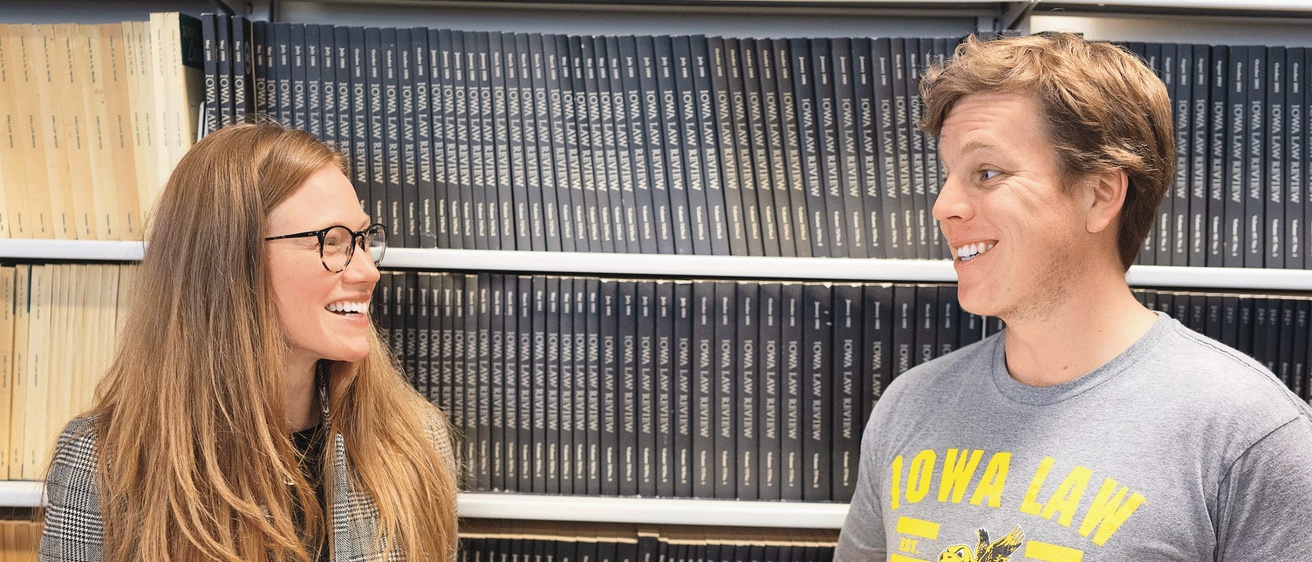The Law School's emphasis on superior writing skills gives its graduates a significant advantage
By Dan Frost
Writers everywhere know the University of Iowa as a mecca, with its world-renowned Iowa Writers’ Workshop producing published authors like an Iowa farm growing stalks of corn. It should come as no surprise, then, that the university’s law school also produces accomplished writers, as a national leader in teaching writing to prospective lawyers.
“We’re rare among top law schools to have dedicated legal writing faculty,” said Dawn Anderson (95JD, 18EdS), one of six Legal Analysis, Writing & Research (LAWR) professors and the director of the law school’s Writing and Academic Success Center. “We have probably about 120 years of legal writing teaching experience among the six of us.”
For the College of Law, it has always made perfect sense. According to Christopher Liebig (99MFA)—another LAWR professor—the late Professor Randall Bezanson (71JD), who taught at the school for many years, “believed that, if it is poorly written, necessarily it is poorly reasoned.
"While that may be an overstatement,” Liebig said, “the ability to write clearly is tied to the ability to think clearly. We hope we are developing both of those skills in the way we are teaching the program.”
Liebig is committed to writing: After earning a law degree from Harvard and practicing law, he switched directions and earned his MFA in fiction at the Iowa Writers’ Workshop. While there, he started helping out in the law school’s writing center, and then teaching writing courses. Eventually, the law “pulled me back in,” he said with a laugh.
“I’d put Iowa up against any program when it comes to how much individualized feedback we give,” Liebig said, citing small class sizes. “That’s a main strength of the program.”
Iowa Law has emphasized writing since David Vernon’s tenure as dean in the late 1960s, Liebig said. Anderson said legal writing was a core class, but Dean Carolyn Jones moved the program into a higher gear in 2006 by hiring dedicated faculty. Dean Kevin Washburn doubled down on this core strength by expanding the LAWR faculty and infusing writing elsewhere in the curriculum. He nicknamed Iowa Law the “Writing Law School” to differentiate it from other American law schools.
“ I’d put Iowa up against any other program when it comes to how much individualized feedback we give. That’s a main strength of the program.” – Christopher Liebig (99MFA)
Walk Across the River
Many writers use “the river” as a powerful metaphor in their work, whether crossing it, like the Rubicon, or watching it flow endlessly to the sea. For Mary Jane White (77MFA, 79JD), however, crossing the Iowa River was how she connected her life as a writer and a lawyer.
White left Duke Law School in 1974, where she felt uncomfortable as one of the first women law students. She came to the Iowa Writers’ Workshop to shift gears. “I noticed a law school across the river from the English department,” she said. “I thought, maybe I can take a few courses and graduate faster.”
White wound up staying in Iowa with a successful career as a published author, poet and translator—and as an attorney with criminal defense stories that could fill a John Grisham novel. One eight-year murder case ended in acquittal, thanks to a yellow plastic cup she found in the getaway car that placed her client away from the scene of the crime.
“I used to write opening statements as if they were poems and phrases,” White said. “I would think: How would I get the basic story across to the jury in a convincing enough way that they would believe me and all the witnesses I vouched for?
“In the murder case we said: ‘People see things and talk about them differently. And people lie. But a cup cannot lie to you. And it can’t move, except if it’s carried by a person.’
“The line ‘The cup cannot lie,’ helped the jury fasten onto something in what was a very confusing situation,” she said.
The Next Generation
Iowa native Kate Conlow graduated from Vassar College and had a decade-long career as a writer and editor, including a four-year stint as the managing editor at The Iowa Review, the university’s literary magazine. At an Iowa Law open house, she fell head over heels. Now a third-year law student, Conlow is editor-in-chief of the Iowa Law Review, one of four student-run journals at the school.
“I came from a heavy writing background, but it was surprising to find out there’s a lot of writing in law school,” she said. “It was helpful to have that foundation.”
While Conlow already knows some pillars of writing—use the active voice!—the legal approach required some retraining. In her first semester, she learned the foundational structure: Write a thesis sentence, state the legal rule, then give your analysis, then write a conclusion that restates your thesis sentence.
“ I came from a heavy writing background, but it was surprising to find out there’s a lot of writing in law school. It was helpful to have that foundation.” – 3L Kate Conlow
Having that formula down helped in her other classes. She also credits the small class sizes and the writing center, where everyone from fellow students to center director Dawn Anderson have proved helpful.
Conlow recollects her experience in her second-semester legal writing course—taught by Professor Lorie Schweer (03JD)—in which she found herself writing an appellate brief. “That was so much fun,” she said.
The case involved a gas pipeline explosion that killed several campers; the firefighters responding to the fire sued the gas company for negligent infliction of emotional distress. “I was, unfortunately, on the gas company’s side,” Conlow said. “But Professor Schweer taught me to write an effective argument even when the sympathies are not on the side of your client.”
